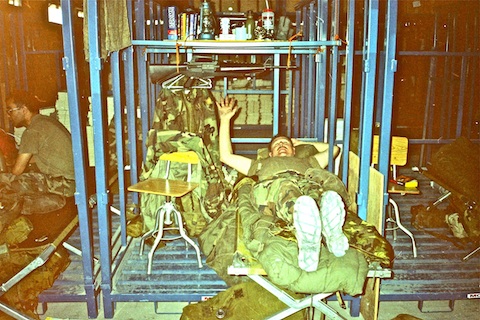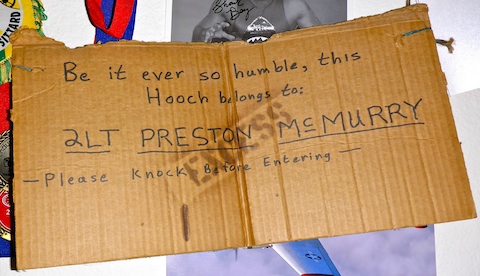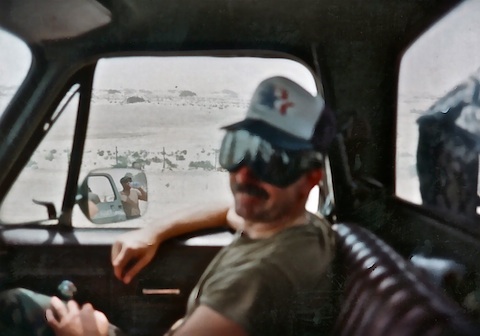North to Kuwait City
Kuwait City—The basic building blocks in what became a miniature city inside the warehouse were metal storage cubicals, roughly 6′ x 6′ x 6′. The troops turned those cubicals into apartments, and then into row houses, and then into two-story penthouses. Privacy was provided by hanging up rain ponchos. And finally, personality was added by taping up decorations of all sorts. There were flags, grade school drawings sent from home, family pictures, and clusters of Iraqi helmets¹.

When construction of the indoor city was complete, it not only had decorated streets, but even a commercial center. Near the corner of what could have been the intersection of Green Bay’s Walnut and Adams streets, CPT James Pressner’s “establishment” was located. The sign above his door read “Jim’s Knot Inn.” The bill boards, only a slight exaggeration, advertised goods of every description to be bought, sold, or bartered. Next door, customers interested in building construction found “Jackpine Palace.” The imaginary “Jackpine Industries” was a multinational corporation with offices in northern Wisconsin and now Kuwait City. Locally, SSG Jeff Poh was best known for solving the latrine shortage by customized construction of two-hole, outhouse benches. Of course, solving that crisis created another crisis that fell on the shoulders, not literally, of junior enlisted personnel who were assigned — in polite terms — waste disposal duties². Thus, the indoor city had the quaint touch of old-time Americana.

The work load, or rather waste load, was eventually reduced by the opening of permanent latrines in the warehouse, once hot and cold running water became available. This coincided with the appearance of another modern convenience, showers. That convenience, however provoked the first political crisis in the indoor city’s early history. Women found out that their shower times were scheduled during duty hours and therefore were less convenient than shower hours for men. Consistent with the quaint style of old-time Americana, this crisis was simply overcome by male dominance and female adaptability rather than civil rights litigation.
One last door sign deserves comment. Across the busy street from the Jackpine Palace, “city” residents were greeted by the sign over Sgt. John Momich’s doorway. Reflecting the feelings of so many of this town’s residents, it read:
In this tiny little area
Of this ill-fated, God forsaken Hell hole
Dwells, defiantly and reluctantly,
Sgt. Momich
McMurry’s Notes
- Almost everyone brought home souvenirs. Some people found the Iraqi equipment in the schools we cleared, others traded for them with the locals. Soviet bayonets were a hot item, especially in Kurdistan. Captain Fingers went way overboard though, eventually shipping home seven duffle bags full of loot. With Iraqi equipment going for vastly inflated prices on the militaria market back in the States, he probably cleared a year or two’s worth of salary.

CPT Fingers. This should have been his promotion photo. - Shit burning: A necessary task when sewers are not available. It is made all the more hideous by combining the smell of shit with the aroma of burning diesel.
The first week we lived in the warehouse we did not have metal barrels in which to burn shit. The first few days we were there, SSG Poh hadn’t even made the plastic bucket shitters. (The contents of which were thrown over the warehouse walls into the surrounding desert until we got the barrels.) So I held it. After a week I was pretty clogged up. Unfortunately my body decided to unclog itself on an afternoon I was out on a mission.
None of the schools we searched had any plumbing or electrical fixtures — not even broken. None. (The Iraqis had taken everything with them.) Naturally it was while searching a school that I got the urge. I didn’t want to crap on the floor like the Iraqi’s, but there was no place else to go. So, I did what I could to respect the Kuwaitis’ property: I found a plastic bucket, went into the bathroom, and took care of business.
| Page 16 | Page 17 | Page 18 |
